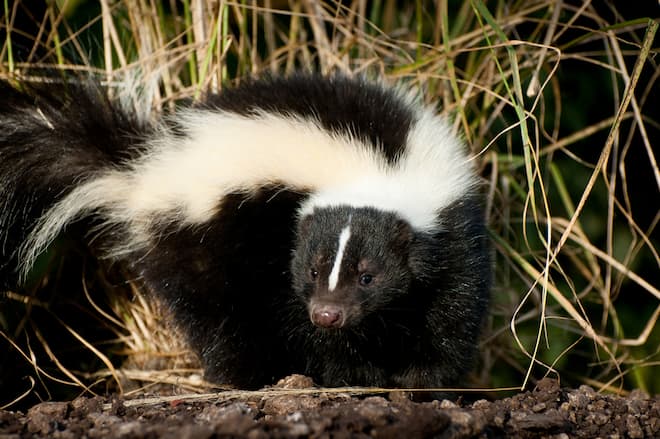Baylisascaris columnaris is a roundworm found in skunks and can be passed on to different types of animals. Baylisascaris is a type of roundworm found in different types of animals including the raccoon. The roundworm is usually passed down to dogs. When a roundworm infects a human it can have grave consequences for the health depending on which area the roundworm is found in. The areas of risk are when roundworms invade the eye, brain, and organs. It is not clear whether humans can be affected by Baylisacaris.c found in skunks. In raccoons, the roundworm is a different story altogether. Read below for more information.
Children and pets are the most at risk from swallowing roundworm eggs. If you see random holes around your lawn you may be dealing with skunks. Call the skunk removal team from Skunk Control now.
People usually acquire roundworms from raccoons by eating the eggs of the roundworm indirectly. The most vulnerable group at risk are young children who might put dirt in their mouths and unintentionally ingest the eggs by means passing through the feces of raccoons. “…signs and symptoms of raccoon roundworm infection include nausea, tiredness, liver enlargement, loss of coordination, lack of attention to people and surroundings, loss of muscle control, blindness, and coma.
Symptoms will develop within 1 to 4 weeks after an exposure…” The eggs of roundworms typically hatch after two to four weeks after being able to cause an infection. In environments, with adequate moisture, these eggs can live up to several years. To avoid roundworms by raccoons it is advised to teach young children the importance of good hygiene after having played outside. Fences can be put up to deter raccoons from entering your property. The keeping of raccoons as domestic pets is therefore highly discouraged.
In the case of both the raccoon and skunk, One must avoid contact with skunks and raccoons in any kind of way as most skunks and raccoons are infected with roundworms. To ensure personal safety from being infected it is advised to remove any raccoon and skunk dens, raccoon and skunk feces, and latrines that skunks and raccoons may be actively using. To remove any kind of excretion and or feces please remember to wear the appropriate protective gear including the utilization of gloves during the removal process. It is essential that the symptoms mentioned above should be treated as soon as possible and that proper hygiene on a daily general basis is required to limit the chance of being infected by roundworms.
If you either find raccoon or skunk presence, it is advisable to contact a wildlife control service. Wildlife technicians are specialized, trained, and insured to handle wildlife cases throughout urban cities. Apart from that, wildlife technicians have years of experience under their belt making the entire process quick and seamless. When latrines are spotted by technicians, they will take all the necessary precautions to assure their safety and that of the customer. To learn more about the skunk or raccoon removal process, call

